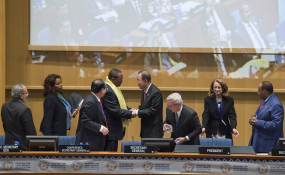This week, Addis Ababa, Ethiopia’s capital and a city full of symbolic importance for all of Africa, will host the Third International Conference on Financing for Development. Most developing countries hold high expectations for the conference. They hope it will offer new means to improve social welfare at a time when financing their development needs has become increasingly difficult. For most African countries, the key challenge nowadays is structural economic transformation. Simply put, our economies must be able to create enough good jobs to employ growing populations. Africa is home to one billion people, 74% of whom are younger than 24, and 61.3% of whom are women. The United Nations predicts that by 2040, just one generation from now, Africa’s total population will exceed two billion – 70.1% under the age of 25, with women accounting for 57.7%.
For most African countries, the key challenge nowadays is structural economic transformation. Simply put, our economies must be able to create enough good jobs to employ growing populations. Africa is home to one billion people, 74% of whom are younger than 24, and 61.3% of whom are women. The United Nations predicts that by 2040, just one generation from now, Africa’s total population will exceed two billion – 70.1% under the age of 25, with women accounting for 57.7%.
These young men and women need – and are increasingly demanding – high-quality education and jobs. Thus, African governments must seize this opportunity to advocate for increased financing for sustainable development, building on the mobilization of more significant domestic revenue.
The good news is that there has been real progress on this front. At both the national and regional levels, policymakers are paying greater attention to domestic resource mobilization as a means of leveraging the effectiveness of external assistance. In this context, strengthening our countries’ administrative capacity is critical, for it will enable us to make the best possible use of the financial and technical assistance provided by bilateral and multilateral institutions.
Nonetheless, the fact remains that, in addition to domestic financial resources, mobilization of external resources will be needed to meet additional financing needs and achieve the Sustainable Development Goals, the 15-year global framework that the UN will adopt in September. Indeed, given the constraints on the capacity of most African countries to attract private financing, it is critical that the international community increase official development assistance (ODA) if the SDGs are to be achieved.

That is why we must encourage multilateral institutions such as the African Development Bank (AfDB), the International Monetary Fund, and the World Bank to continue to improve African countries’ access to their concessional and non-concessional resources. They should also support our efforts to realign the existing frameworks for mobilizing ODA and ensure more timely and predictable access to external financing, along the lines established by the Paris Declaration on Aid Effectiveness, which specifies guidelines for monitoring and measuring how donor financial assistance is used.
In this sense, the conference in Addis is being held at an opportune moment, because it coincides with efforts to revise the rules of the international tax system. Some 14 countries, including Senegal, are involved in the implementation of the Base Erosion and Profit Shifting (BEPS) project, which seeks to create greater transparency in taxation regimes. But we recognize that we must go beyond BEPS and address broader issues related to the fiscally costly tax incentives found in investment, mining, and petroleum codes. These incentives often deprive our governments of resources that could be used to fund essential development projects.
The Addis meeting also provides a unique opportunity for a deeper analysis of issues related to illicit financial activities – another big drain on African treasuries. Indeed, the revenue shortfalls induced by such activities are estimated to cost African countries between $30-60 billion a year, a sum that falls within the neighborhood of total ODA received by Africa ($46.1 billion in 2012 ).
Sadly, the problem has been getting worse in recent years. That is why I welcome the US-Africa Partnership to Combat Illicit Finance, which aims to promote transparency in public financial management, combat corruption, strengthen judiciaries and the rule of law, and ensure greater accountability to civil-society and private-sector actors. The partnership’s first meeting was held in Dakar on June 25, with a view to establishing a working group comprising several African countries and observers from organizations such as the AfDB, the IMF, the World Bank, and the OECD.
Achieving greater transparency in public administration will require sustained implementation of projects – such as the Extractive Industries Transparency Initiative (EITI), the Construction Sector Transparency Initiative, and others – that shine a spotlight on the behavior of governments and investors. Similarly, revising mining and petroleum codes, as appropriate, could help improve transparency and ensure more equitable revenue-sharing arrangements between investors and the countries in which they operate.
This week’s conference in Addis Ababa should lay the foundation for more effective external financing of sustainable development over the course of the SDGs. But the quality of what is built on that foundation will depend on the commitment and mobilization of all actors, particularly those from Africa.
Source: Project Syndicate/SS






























